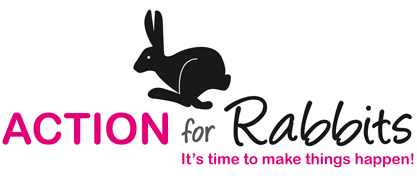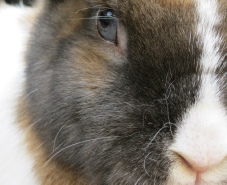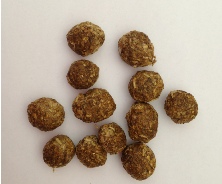


E: info@actionforrabbits.co.uk
Terms and Conditions Privacy Policy Site Map Cookies









Even the most well looked after rabbits can become ill. Rabbits have a very sensitive digestive system, a fragile immune system, are prone to stress, don’t cope well with severe temperature changes and are at risk from many life threatening illnesses. The worst part of all this is that being prey animals it is your rabbits nature to hide any illness! You will need to get to know your rabbits in order to pick illness up at the very first sign. Prompt action will save life.
If one of your rabbits is not behaving normally, you are concerned and you can’t attribute this to anything in particular (e.g. change in surroundings, diet, circumstance (loosing a partner rabbit, recent medical intervention), you must seek veterinary attention immediately. Rabbits can go downhill very quickly indeed and delayed treatment, can often cause unwanted suffering or possible early death
Prevention
Finding the right vet
The very first thing you need to do is to register your Rabbits with a vet who has experience in rabbit medicine, often called exotic vets.

Neutering
Neutering your rabbits is essential before bonding and for behavioural issues and also to protect against illnesses.
Vaccinating
All rabbits should be vaccinated against Myxomatosis and VHD but with the qualification that the rabbit needs to be in good health to receive it and therefore will get a full health check prior to administration. Myxomatosis and VHD are now being administered a single vaccine in the UK (known as RHD - as of 2012) rather than three each year for the rabbits involved.
A vet that tells you that a house rabbit does not need vaccination probably does not understand how both diseases are transmitted and should be avoided at all costs. Myxomatosis and VHD are transmitted by biting insects and so being indoors is no protection as flies can get inside.VHD is transmitted by the wind, in hay, by direct contact so you can carry it on your clothes, footwear and hands.
Health check
The good thing about getting your bunnies checked by a knowledgeable and experienced rabbity vet is that they should pick up on any issues that might be in their infancy and hopefully head them off at the pass. Often the first time a vet will see your bunnies will be when you bring them home from the shop/breeder/rescue and want them to be registered and checked over, or maybe when they first go for their vaccinations.Your vet will check lots of things to give an overall picture of what is going on.
The article in the link below will help you to understand what sort of thing you should see your vet doing when giving your rabbits a good health check, it will also give you a god idea on what to look out for as signs of illness.


- Not eating, drinking (EMERGENCY)
- Not pooing or weeing (EMERGENCY)
- Sitting in a hunched or strained position (EMERGENCY)
- Bleeding (EMERGENCY)
- That are floppy or listless (EMERGENCY)
- Refusing to get up (EMERGENCY)
- Having a bloated tummy (EMERGENCY)
- With maggots on skin and or lesions (EMERGENCY)
- Sneezing
- Straining to wee
- With nasal or ocular discharge
- With a wet chin
- With a wet or mucky bottom
- With white fluffy ‘powdery’ substance at root of fur
- With bald patches in skin
- With bald or sore and infected hocks
- Not moving correctly/limping
- Tooth-grinding (not to be confused with tooth purring)































The following information has kindly been provided by:
Each topic below will link directly the the HRS














































